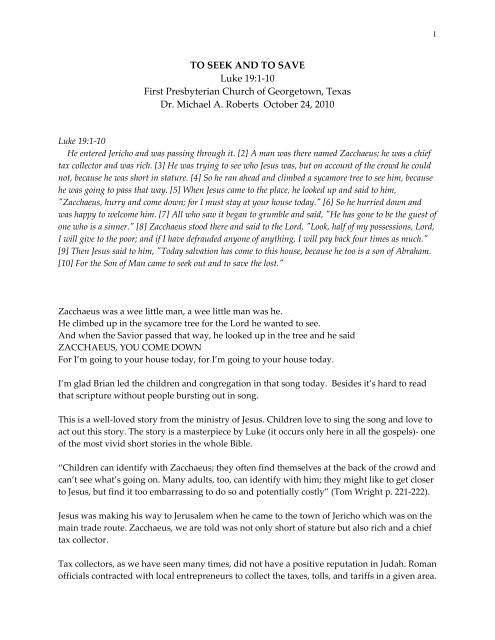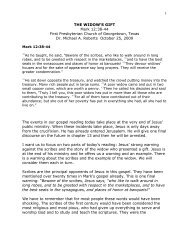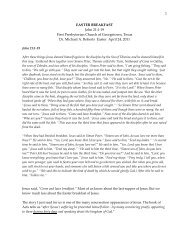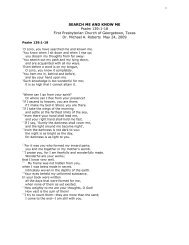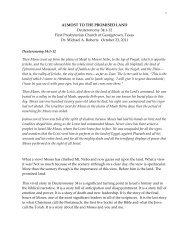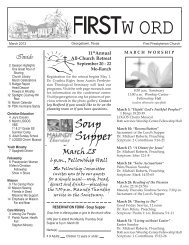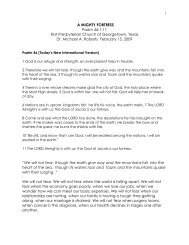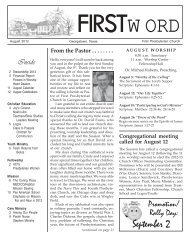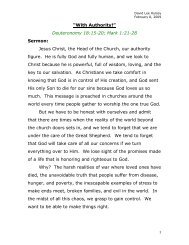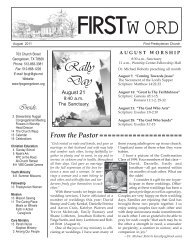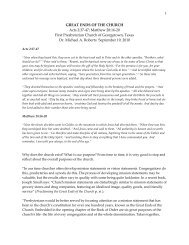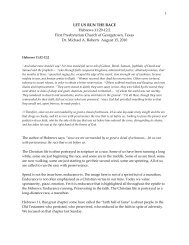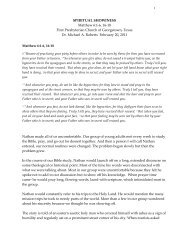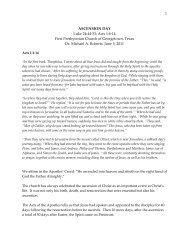TO SEEK AND TO SAVE Luke 19:1-10 First Presbyterian Church of ...
TO SEEK AND TO SAVE Luke 19:1-10 First Presbyterian Church of ...
TO SEEK AND TO SAVE Luke 19:1-10 First Presbyterian Church of ...
Create successful ePaper yourself
Turn your PDF publications into a flip-book with our unique Google optimized e-Paper software.
1<br />
<strong>TO</strong> <strong>SEEK</strong> <strong>AND</strong> <strong>TO</strong> <strong>SAVE</strong><br />
<strong>Luke</strong> <strong>19</strong>:1-<strong>10</strong><br />
<strong>First</strong> <strong>Presbyterian</strong> <strong>Church</strong> <strong>of</strong> Georgetown, Texas<br />
Dr. Michael A. Roberts October 24, 20<strong>10</strong><br />
<strong>Luke</strong> <strong>19</strong>:1-<strong>10</strong><br />
He entered Jericho and was passing through it. [2] A man was there named Zacchaeus; he was a chief<br />
tax collector and was rich. [3] He was trying to see who Jesus was, but on account <strong>of</strong> the crowd he could<br />
not, because he was short in stature. [4] So he ran ahead and climbed a sycamore tree to see him, because<br />
he was going to pass that way. [5] When Jesus came to the place, he looked up and said to him,<br />
"Zacchaeus, hurry and come down; for I must stay at your house today." [6] So he hurried down and<br />
was happy to welcome him. [7] All who saw it began to grumble and said, "He has gone to be the guest <strong>of</strong><br />
one who is a sinner." [8] Zacchaeus stood there and said to the Lord, "Look, half <strong>of</strong> my possessions, Lord,<br />
I will give to the poor; and if I have defrauded anyone <strong>of</strong> anything, I will pay back four times as much."<br />
[9] Then Jesus said to him, "Today salvation has come to this house, because he too is a son <strong>of</strong> Abraham.<br />
[<strong>10</strong>] For the Son <strong>of</strong> Man came to seek out and to save the lost."<br />
Zacchaeus was a wee little man, a wee little man was he.<br />
He climbed up in the sycamore tree for the Lord he wanted to see.<br />
And when the Savior passed that way, he looked up in the tree and he said<br />
ZACCHAEUS, YOU COME DOWN<br />
For I’m going to your house today, for I’m going to your house today.<br />
I’m glad Brian led the children and congregation in that song today. Besides it’s hard to read<br />
that scripture without people bursting out in song.<br />
This is a well-loved story from the ministry <strong>of</strong> Jesus. Children love to sing the song and love to<br />
act out this story. The story is a masterpiece by <strong>Luke</strong> (it occurs only here in all the gospels)- one<br />
<strong>of</strong> the most vivid short stories in the whole Bible.<br />
“Children can identify with Zacchaeus; they <strong>of</strong>ten find themselves at the back <strong>of</strong> the crowd and<br />
can’t see what’s going on. Many adults, too, can identify with him; they might like to get closer<br />
to Jesus, but find it too embarrassing to do so and potentially costly” (Tom Wright p. 221-222).<br />
Jesus was making his way to Jerusalem when he came to the town <strong>of</strong> Jericho which was on the<br />
main trade route. Zacchaeus, we are told was not only short <strong>of</strong> stature but also rich and a chief<br />
tax collector.<br />
Tax collectors, as we have seen many times, did not have a positive reputation in Judah. Roman<br />
<strong>of</strong>ficials contracted with local entrepreneurs to collect the taxes, tolls, and tariffs in a given area.
2<br />
These entrepreneurs, called the “chief tax collector” here were required to pay the contract in<br />
advance. The chief tax collector would then employ others to collect the taxes, hoping that the<br />
amount collected would yield a pr<strong>of</strong>it. This system was open to abuse, as you might imagine.<br />
The Jews who collected taxes for the Romans were assumed to be dishonest and were hated by<br />
other Jews for their complicity with the Gentile oppressors (New Interpreter’s Bible pp. 356-7).<br />
As chief tax collector, Zacchaeus had reached the top <strong>of</strong> his pr<strong>of</strong>ession. He was likely one <strong>of</strong> the<br />
wealthiest people in the region. He was also one <strong>of</strong> the most hated people in that region.<br />
“Nobody in Jericho liked Zacchaeus. They would have been horrified to think that, <strong>of</strong> all the<br />
inhabitants <strong>of</strong> the town, he would be the one known by name to millions <strong>of</strong> people two<br />
thousand years later” (Tom Wright p. 222).<br />
Yet Zacchaeus was also a seeker. A seeker after Jesus. He may have been wealthy but he was<br />
not content. The riches had not brought him happiness. Inevitably, his pr<strong>of</strong>ession had alienated<br />
him from others and he was lonely.<br />
Zacchaeus ran ahead and climbed a sycamore tree. In doing so, he exposed himself to ridicule.<br />
It was considered undignified for a grown man to run in that time, and a man <strong>of</strong> his<br />
importance would certainly not climb a tree. The crowd would have thought this was funny or<br />
silly- a tax collector running and climbing up a tree. Perhaps they giggled or laughed at him.<br />
But Zacchaeus did not care about appearances. And Jesus was impressed, Zacchaeus was<br />
willing to be ridiculed in order to seek after Jesus. “Zacchaeus (how Jesus knew his name we’re<br />
not sure), hurry and come down; for I must stay at your house today. So he hurried down and was<br />
happy to welcome him.”<br />
Jesus, as a rabbi, would have brought honor to any house that he entered. Therefore, he confers<br />
special honor on Zacchaeus by going to his house.<br />
The laughing <strong>of</strong> the crowd turns to grumbling. “Jesus has gone to be the guest <strong>of</strong> one who is a<br />
sinner. the house <strong>of</strong> a sinner.” “Can you believe that Jesus would spend time with him He’s not<br />
holy! He’s not spiritual! He’s a crook! He doesn’t deserve Jesus’ attention. Jesus should spend<br />
his time with those who are spiritual, those who want to grow, those who deserve his<br />
presence.”<br />
In another place in the gospels, the question was asked “why does Jesus eat with tax collectors<br />
and sinners” Jesus responded by saying “Those who are well have no need <strong>of</strong> a physician, but those<br />
who are sick...For I have come to call not the righteous but sinners” (Matthew 9:<strong>10</strong>-13). Or as the <strong>First</strong><br />
Epistle to Timothy would say later on “Christ Jesus came into the world to save sinners” (1 Tim.<br />
1:15).
3<br />
This is what he does when he goes to Zacchaeus’ home. He seeks out those who some religious<br />
people think should not be saved.<br />
Zacchaeus for his part declares a willingness to change. He acknowledges that he may have<br />
been unfair to people. He declares that he will make amends for any past wrongs he may have<br />
done. Earlier in this gospel, <strong>Luke</strong> tells the story <strong>of</strong> John the Baptist. While John was baptizing it<br />
says, “even tax collectors came to be baptized” and they asked “teacher, what should we do” He said<br />
to them, “Collect no more than the amount prescribed for you” (<strong>Luke</strong> 3:12-13). John’s general<br />
counsel was for people to “bear fruit worthy <strong>of</strong> repentance” (<strong>Luke</strong> 3:8)<br />
Zacchaeus takes steps to show everyone that he’s a changed person. He announces that he is<br />
willing to make restitution: “I will give half <strong>of</strong> my possessions to the poor; and if I have defrauded<br />
anyone <strong>of</strong> anything, I will pay back four times as much.” That is serious restitution. Zacchaeus<br />
joyfully pledges to bear fruit worthy <strong>of</strong> repentance.<br />
Zacchaeus’ pledge satisfies both the laws <strong>of</strong> restitution in the Old Testament and also the<br />
standard proposed earlier in the gospel by John the Baptist. He is willing to make amends for<br />
what he has done wrong. He is willing to use his wealth in positive, supportive ways.<br />
Zacchaeus is the perfect anti-type to the rich ruler that Jesus encounters in the previous<br />
chapter, <strong>Luke</strong> 18:18-23. Remember, the rich ruler had asked Jesus what must I do to inherit<br />
eternal life. Jesus instructed him “Sell all that you own and distribute to the poor, and you will have<br />
treasure in heaven; then come, follow me.” But when “he heard this, he became sad; for he was very<br />
rich.” Jesus commented: “How hard it is for those who have wealth to enter the kingdom <strong>of</strong> God!<br />
Indeed, it is easier for a camel to go through the eye <strong>of</strong> a needle than for someone who is rich to enter the<br />
kingdom <strong>of</strong> God.” We are glad the crowd asks “then who can be saved” Jesus answers “What is<br />
impossible for mortals is possible for God.”<br />
Then fourteen verses later in <strong>Luke</strong>’s gospel we have the story <strong>of</strong> Zacchaeus. Here the<br />
impossible is made possible by God. Zacchaeus is the rare camel who does make it through the<br />
eye <strong>of</strong> the needle. Whereas the rich ruler leaves Jesus sad, Zacchaeus was “happy to welcome<br />
him”. Whereas the rich ruler makes wealth his idol, Zacchaeus freely gives away his wealth.<br />
This is just as much a miracle in gospel-writer <strong>Luke</strong>’s mind as the blind who are able to see, the<br />
lame who can walk, and the dead who are made alive.<br />
Jesus pronounces that “today, salvation has come to this house.” At the beginning <strong>of</strong> the story,<br />
Zacchaeus is depicted as a seeker. He was trying to see Jesus. In the end though, it is Jesus, who<br />
is the one who takes the initiative to meet and brings healing to Zacchaeus. It is Jesus who is<br />
the one who seeks out and saves the lost.<br />
In our story in <strong>Luke</strong> <strong>19</strong> today, Jesus summarizes his whole mission in verse <strong>10</strong>: “For the Son <strong>of</strong><br />
Man (this is Jesus’ most commonly used title <strong>of</strong> self-identification) came to seek out and save the<br />
lost.” Jesus is engaged in a seek and save mission.
4<br />
I am reminded <strong>of</strong> the movie Saving Private Ryan. The movie received a great deal <strong>of</strong> attention a<br />
decade ago primarily because <strong>of</strong> its dazzling and quite graphic opening sequence depicting D-<br />
Day in <strong>19</strong>44.<br />
The story <strong>of</strong> the movie, which historians admit stretch the bounds <strong>of</strong> reality, is essentially this:<br />
three brothers have all died in the fighting <strong>of</strong> World War II. A fourth brother remains. In order<br />
to save one son for the family, a team <strong>of</strong> soldiers are commissioned by the army’s chief <strong>of</strong> staff<br />
with a unique task- to seek out and save Private Ryan. These soldiers go through the storming<br />
<strong>of</strong> Normandy on D-Day and then search the countryside <strong>of</strong> France looking and seeking after<br />
this one soldier, attempting to save Private Ryan. Ultimately, they are successful, at great cost<br />
and sacrifice.<br />
The story line <strong>of</strong> this movie is similar to the mission <strong>of</strong> God in the world. To seek out and save<br />
human beings. In more recent days, we could also think <strong>of</strong> the Chilean miners. What an<br />
amazing story that has been- a great story <strong>of</strong> a seek and save mission. What must those 17 days<br />
have been like for those miners before anybody discovered them: “Have we been forgotten<br />
Do they even know we are here”But they did. An amazing story <strong>of</strong> engineering, technology,<br />
love, and perseverance. To seek and to save.<br />
The gospel <strong>of</strong> <strong>Luke</strong> is full <strong>of</strong> examples <strong>of</strong> Jesus pursuing this seek and save mission. There is the<br />
parable <strong>of</strong> the lost, prodigal son who is saved from his failures. There are the parables <strong>of</strong> the<br />
lost sheep and the lost coin- when they are sought and saved- there is rejoicing. There is the<br />
parable <strong>of</strong> the great banquet which includes the saving <strong>of</strong> the poor, the lame, and the blind.<br />
There is the leper in <strong>Luke</strong> 17 who is saved from leprosy and is grateful. When we come to <strong>Luke</strong><br />
<strong>19</strong>, Jesus is about to enter Jerusalem for the final week <strong>of</strong> his life. But there is one more story,<br />
one more great example <strong>of</strong> Jesus’ seek and save mission: Zacchaeus.<br />
This story, almost as much as any other, almost as much as the parable <strong>of</strong> the prodigal son,<br />
reveals the mission <strong>of</strong> Jesus. As I have thought about this story this week, there are two<br />
implications that spring to mind from this story.<br />
The first is this- each <strong>of</strong> us has been and still is the target <strong>of</strong> a seek and save mission. This is a<br />
search that is motivated by love. This is a rescue mission. This is God’s quest for us. The<br />
“hound <strong>of</strong> heaven” as C.S. Lewis used to say, is after us. Christ comes to seek and save because<br />
he loves us. Zaccheus thought he was seeking to see Jesus, but in reality Jesus was seeking<br />
Zacchaeus.<br />
This mission is not completed even after we accept Christ into our lives. We continue to be in<br />
need <strong>of</strong> saving. All <strong>of</strong> us still find ourselves in the wrong place at times, lost at times. All <strong>of</strong> us<br />
continue to need the challenging, transforming presence <strong>of</strong> the Holy Spirit in our lives. All <strong>of</strong><br />
us need guidance, perspective, and peace. All <strong>of</strong> us are continually the targets <strong>of</strong> Christ’s seek<br />
and save mission in the world today.
5<br />
One more implication- the church’s mission is primarily a seek and save mission. Our call is<br />
to seek people who are in need <strong>of</strong> Christ’s love, which means everybody. To communicate as<br />
effectively as we can that God loves us. This God calls us to live differently and promises<br />
ultimate fulfillment.<br />
When people come to our church we are called to educate and deepen their faith, to help them<br />
learn how to love God and people more fully, to send people out in mission.<br />
It is so easy to be distracted from this life-saving mission. To get involved in many other<br />
worthy pursuits. To confuse being nice with saving lives. To form a club and not a mission. The<br />
church has always struggled with “mission creep”. The original mission to seek and save<br />
human beings can easily “creep” or change into something quite different.<br />
In conclusion, let me share with you the parable <strong>of</strong> the life-saving station which seems fitting<br />
today.<br />
On a dangerous seacoast where shipwrecks <strong>of</strong>ten occur, there was once a crude little lifesaving<br />
station. There was only one boat but the few devoted members kept a constant watch over the<br />
sea. They went out day and night, tirelessly searching for the lost. Some people in the<br />
surrounding community and some <strong>of</strong> the people who were saved wanted to be associated with<br />
the life-saving station. They gave <strong>of</strong> their time, money, and effort to support the work. New<br />
boats were purchased and new crews were trained. The little life-saving station grew.<br />
Some <strong>of</strong> these new members <strong>of</strong> the lifesaving station were unhappy that the building was so<br />
crude and poorly equipped. They felt a more comfortable place should be provided as the first<br />
refuge <strong>of</strong> those who were saved from the sea. They replaced the emergency cots with beds and<br />
put better furniture in the enlarged building. Now, the life-saving station became a popular<br />
gathering place for its members, and they decorated it beautifully because they used it as sort<br />
<strong>of</strong> a club.<br />
Fewer members were now interested in going to sea on lifesaving missions, so they hired<br />
lifeboat crews to do this work. The lifesaving motif still prevailed in the club’s decorations, and<br />
there was a memorial lifeboat in the room where the club initiations were held.<br />
About this time a large ship was wrecked <strong>of</strong>f the coast, and the hired crews brought in<br />
boatloads <strong>of</strong> cold, wet, half-drowned people. The beautiful new club was in chaos and all<br />
messed-up. At the next meeting, there was a split in the club membership. Most <strong>of</strong> the<br />
members wanted to stop the club’s lifesaving activities because they felt they were unpleasant<br />
and a hindrance to the normal social life <strong>of</strong> the club. A small number <strong>of</strong> members insisted upon<br />
lifesaving as their primary purpose and pointed out that they were still called a lifesaving<br />
station. This small group was voted down and told that if they wanted to save lives, they could<br />
begin their own lifesaving station down the coast.
6<br />
They did. As the years went by, however, the new station experienced the same changes that<br />
had occurred in the first station. It too evolved into a club and yet another lifesaving station<br />
was soon founded. History continued to repeat itself and eventually there were a number <strong>of</strong><br />
clubs along that shore. Shipwrecks are frequent in those waters, but many <strong>of</strong> the passengers are<br />
lost at sea because there is no one to throw them a lifeline.<br />
The church’s mission is the same as Jesus’ mission- to seek out and to save.


